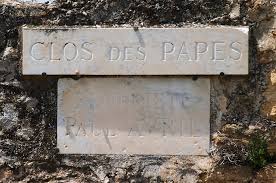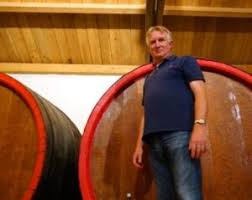Clos des Papes (Paul Avril) has a long history in the region thanks to the first Paul Avril. Avril was born in 1873 and passed away after 91 great years in the appellation. In fact, Avril was one of the key people responsible for the official birth of the Chateauneuf du Pape appellation. Avril began producing and selling Clos des Papes all the way back in 1896.

However, the Avril family has a much longer history in Chateauneuf du Pape that can be traced back to the 18th century. During the second half of the 1700s’s historical records show references to members of the Avril family having acted as treasurers and municipal consuls. Clos des Papes was one of the first estates in Chateauneuf du Pape, as well as in all of the Rhone Valley, to produce, bottle, and sell their own wine. Their first wine bearing the Clos des Papes label was released in 1896!
The second Paul Avril joined Clos des Papes in 1963. He passed away in 2009. The current director is Paul Vincent Avril, who was born in 1965. He started to work at Clos des Papes in 1988. Paul Avril trained at several other wineries before joining the family business at Clos des Papes. Paul Vincent Avril even had a stint at Chateau Mouton Rothschild in Bordeaux where he learned more about winemaking and the trade.

It could be said that Paul Avril is a modern traditionalist. On the one hand, he destems the grapes, seeks low yields, and does not filter. On the other hand, Paul Vincent Avril eschews new oak and would not consider producing a high-end cuvee. His staunch philosophy is that would only serve to harm their main brand, which is Clos des Papes, a wine that has been produced for more than a century. In 2002, it was the idea of Paul Vincent Avril to start using the unique embossed bottle you see for Clos des Papes to this day.
The vineyard of Clos des Papes consists of 35 hectares of vines that are spread over 24 separate parcels in the Chateauneuf du Pape appellation for the production of their wine. 4 hectares in their cooler terroir are reserved for grapes used in the production of Clos des Pape Blanc, their white Chateauneuf du Pape wine. 31 hectares are used to plant grapes for their red Chateauneuf du Pape. Part of what makes the wine of Clos des Papes special is the range of different terroirs and soils their vineyards are located in.
The vineyards of Clos des Papes have a wide array of terroirs ranging from the rocky soils of La Crau to areas of sand, limestone and gravel soil. Perhaps some of the complexities found in Clos des Papes are in the wine due to different soils their vines are planted in. They also have some of their best Grenache vines planted in sandy soils in the west and and southeastern part of the appellation. In the northeastern part of the appellation, you find they have more of their vines planted in the on soils littered with rocks, stones, clay and limestone.
Most of these vines are devoted to red wines. Only 10% is reserved for production of the white wine. The white wine of Clos des Papes made its debut in 1955. At Clos des Papes, they practice biodynamic farming. In 2010, the property earned the right to be certified as “Agriculture Biologique.”
Clos des Papes remains one of the top wines in the region. Prices have risen, but so has the quality. The wine has the ability to age and evolve for two decades or more. 2007 remains the finest wine they have produced to date. However, a recently tasted bottle of 1945 Clos des Papes showed just how well this wine ages! That bottle was the most fully mature Southern Rhone wine I have yet tasted.
If an award for the most consistent producer in Chateauneuf du Pape were given out for wines made over the past 60 years, or even longer, surely, Clos des Papes would be a contender to win the prize! This is easily borne out when looking at the list of top vintages from the property since the 1940’s.
Clos des Papes produces 2 wines, a red Chateauneuf du Pape and a Chateauneuf du Pape Blanc.
Clos des Papes Rouge is produced from about 65% Grenache, 20% Mourvedre, 10% Syrah and 5% from other varietals that range from Muscardin, Vaccarese to Counoise. It is the goal of Clos des Papes to always include a large portion of Mourvedre in the blend whenever possible, for its spicy qualities and structural backbone. On average, the vines are at least 50 years or older. Yields are kept low. For an example, the young vines are on average 28 hectoliters per hectare while the older vines often have yields of less than 21 hectoliters per hectare. They have some ov their best vines planted close to the village, and in the La Crau and Courthezon lieux-dits.
The grapes are 100% destemmed at Clos des Papes. The first vintage they began destemming their grapes 100% was 1991. Clos des Papes co ferments all their different grape varietals. Vinification takes place in temperature controlled, stainless steel tanks. The wines are fined and not filtered. The wine is aged in old foudres for about 15 months before bottling. The production of Clos des Papes is close to 7,100 cases per year.
Clos des Papes Blanc which made its debut in 1955 is produced from a blend of 20% Roussanne, 20% Grenache Blanc, 20% Clairette, 20% Bourboulenc and 20% Picpoul. The wine is vinified and aged in stainless steel tanks for 6 months. The average annual production is close to 1,000 cases per vintage.
